- Home
- Quizzes
- My Quiz Activity
- Newsletters
- Sports Betting
- MY FAVORITES
- Add Sports/Teams
- SPORTS
-
NFL
- NFL Home
- Arizona Cardinals
- Atlanta Falcons
- Baltimore Ravens
- Buffalo Bills
- Carolina Panthers
- Chicago Bears
- Cincinnati Bengals
- Cleveland Browns
- Dallas Cowboys
- Denver Broncos
- Detroit Lions
- Green Bay Packers
- Houston Texans
- Indianapolis Colts
- Jacksonville Jaguars
- Kansas City Chiefs
- Las Vegas Raiders
- Los Angeles Chargers
- Los Angeles Rams
- Miami Dolphins
- Minnesota Vikings
- New England Patriots
- New Orleans Saints
- New York Jets
- New York Giants
- Philadelphia Eagles
- Pittsburgh Steelers
- San Francisco 49ers
- Seattle Seahawks
- Tampa Bay Buccaneers
- Tennessee Titans
- Washington Commanders
-
MLB
- MLB Home
- Arizona Diamondbacks
- Atlanta Braves
- Baltimore Orioles
- Boston Red Sox
- Chicago White Sox
- Chicago Cubs
- Cincinnati Reds
- Cleveland Guardians
- Colorado Rockies
- Detroit Tigers
- Houston Astros
- Kansas City Royals
- Los Angeles Angels
- Los Angeles Dodgers
- Miami Marlins
- Milwaukee Brewers
- Minnesota Twins
- New York Yankees
- New York Mets
- Oakland Athletics
- Philadelphia Phillies
- Pittsburgh Pirates
- San Diego Padres
- San Francisco Giants
- Seattle Mariners
- St. Louis Cardinals
- Tampa Bay Rays
- Texas Rangers
- Toronto Blue Jays
- Washington Nationals
-
NBA
- NBA Home
- Atlanta Hawks
- Boston Celtics
- Brooklyn Nets
- Charlotte Hornets
- Chicago Bulls
- Cleveland Cavaliers
- Dallas Mavericks
- Denver Nuggets
- Detroit Pistons
- Golden State Warriors
- Houston Rockets
- Indiana Pacers
- Los Angeles Clippers
- Los Angeles Lakers
- Memphis Grizzlies
- Miami Heat
- Milwaukee Bucks
- Minnesota Timberwolves
- New Orleans Pelicans
- New York Knicks
- Oklahoma City Thunder
- Orlando Magic
- Philadelphia 76ers
- Phoenix Suns
- Portland Trail Blazers
- Sacramento Kings
- San Antonio Spurs
- Toronto Raptors
- Utah Jazz
- Washington Wizards
-
NHL
- NHL Home
- Anaheim Ducks
- Arizona Coyotes
- Boston Bruins
- Buffalo Sabres
- Calgary Flames
- Carolina Hurricanes
- Chicago Blackhawks
- Colorado Avalanche
- Columbus Blue Jackets
- Dallas Stars
- Detroit Red Wings
- Edmonton Oilers
- Florida Panthers
- Los Angeles Kings
- Minnesota Wild
- Montreal Canadiens
- Nashville Predators
- New Jersey Devils
- New York Islanders
- New York Rangers
- Ottawa Senators
- Philadelphia Flyers
- Pittsburgh Penguins
- San Jose Sharks
- Seattle Kraken
- St. Louis Blues
- Tampa Bay Lightning
- Toronto Maple Leafs
- Vancouver Canucks
- Vegas Golden Knights
- Washington Capitals
- Winnipeg Jets
- NCAAF
- NCAAM
- Boxing
- Entertainment
- Lifestyle
- Golf
- MMA
- Soccer
- Tennis
- Wrestling
- More Sports
- RESOURCES
- My Account
- YB on Facebook
- YB on Twitter
- YB on Flipboard
- Contact Us
- Privacy Policy
- Terms of Service

John Elway: Career retrospective
The Hall of Fame quarterback and Super Bowl-winning general manager has spent nearly 30 years in the NFL. From his unusual entrance into the league to Von Miller's big night, here are the key moments from John Elway's storied career.
Coveted baseball talent
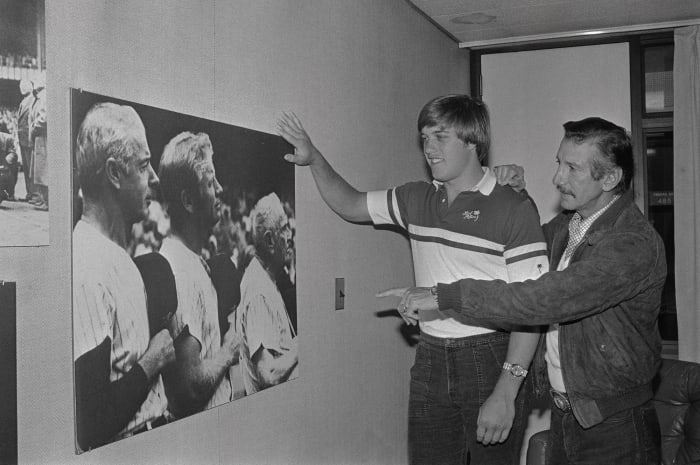
Drafting John Elway in the 1981 second round, the Yankees had high hopes for the Stanford quarterback. After Elway opted to play football instead of joining the Royals' farm system as an 18th-round pick in 1979, he signed for $140,000 and landed on a Yankees short-season A-league team in Oneonta, New York. The left-handed-hitting right fielder whom George Steinbrenner eyed as a future MLB starter hit .318 and walked more than he struck out (28-25) in 42 games in 1982. This became a bargaining chip soon. (Fun fact: The Royals drafted NFL Hall of Famers Elway, Dan Marino and Deion Sanders, along with Pro Bowler Bo Jackson.)
Generational prospect
But football was Elway's top avenue to stardom. The rocket-armed Stanford passer flashed so much he finished second in the Heisman Trophy voting (to Georgia's Herschel Walker) despite the Cardinal finishing 5-6. Only two players, running backs Anthony Thompson (Indiana, 1989) and Troy Davis (Iowa State, 1996), have finished first or second in Heisman balloting on losing teams. The Pac-10 Player of the Year as a sophomore, Elway threw 24 touchdown passes and for 3,242 yards as a senior and was firmly the top prize ahead of the 1983 draft. Elway was recently named Pac-12 Offensive Player of the Century.
On the wrong side of history
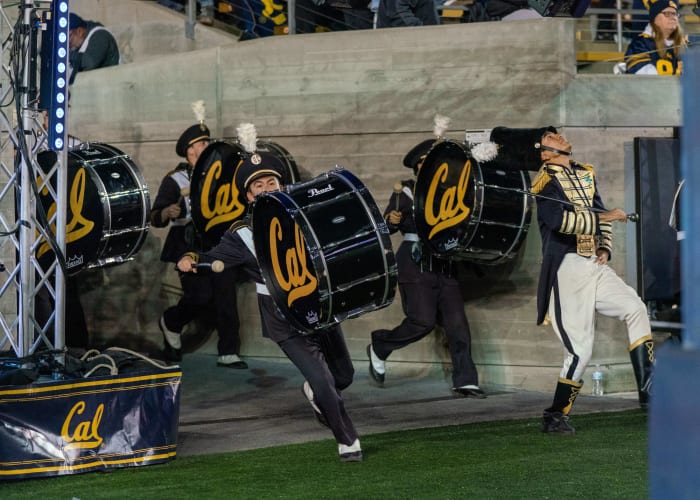
Stanford beat two ranked teams that season — No. 13 Ohio State and No. 2 Washington — but lost its final three games. The final play of Elway's college career lives on. Foreshadowing some future NFL drives, Elway had marched Stanford 69 yards in less than 45 seconds — converting a fourth-and-17 — to set up a go-ahead Cardinal field goal. Cal's response diminished this. The Golden Bears' five-lateral kick return ("The Play") — remembered more for the Stanford band's involvement — gave them a 25-20 win. While one Cal player (lateral No. 3) was down before pitching the ball, Elway finished his career without a bowl game.
Pre-draft bombshell
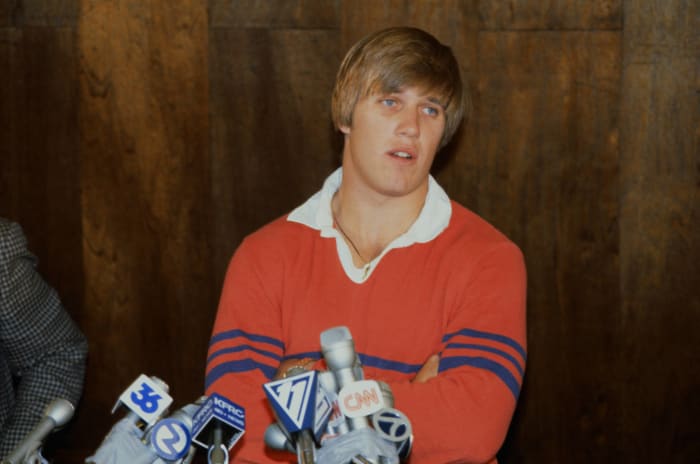
Elway and his father, Jack Elway — then San Jose State's head coach — changed draft history by communicating with the Colts "before Christmas" a lack of desire to play for the then-Baltimore-based franchise. The Colts had used their 1982 first-round pick on QB Art Schlichter, a quick bust, then went 0-8-1. Issues with Colts ownership and head coach Frank Kush prompted the Elways' decision, and they used John's Yankees status as leverage. However, despite a strong Raiders offer for 1983's top pick, the Colts pulled the trigger at No. 1 overall. John continued his leverage play by announcing he would pursue baseball.
Saga sends Broncos golden ticket

Colts GM Ernie Accorsi sought three first-round picks and change, but owner Robert Irsay accepted a lesser offer to send Elway to Denver in the days following the draft. The Broncos, in an NBA-style sequence, sent the Colts the rights to their 1983 first-rounder (tackle Chris Hinton), their '84 first-rounder and backup quarterback Mark Herrmann. Accorsi, who did not sign off on the deal, resigned his post at season's end. A seven-time Pro Bowler, Hinton played seven Colts seasons before being dealt to Atlanta in 1990's Jeff George trade.
Growing pains precede rise to prominence
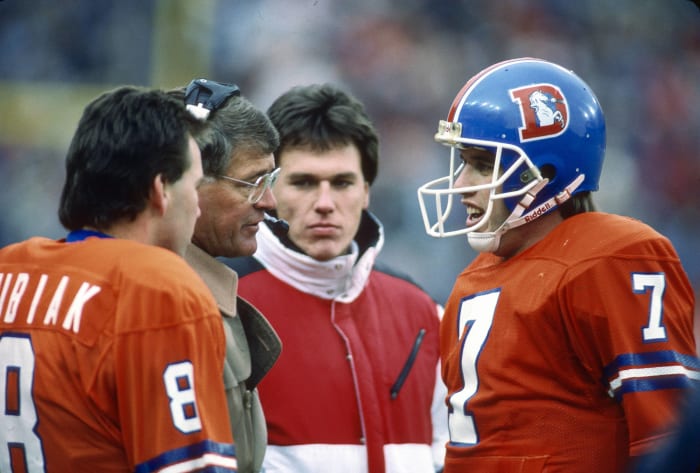
Elway did not adjust quickly to the NFL, throwing seven touchdown passes and 14 interceptions as a rookie. The Broncos made the playoffs that season, but Steve DeBerg went 4-1 in his starts and was behind center for Denver's playoff game, a loss in Seattle. Elway did help the Broncos erase a 19-0 Colts lead in December of '83 to help secure the playoff spot. He then led the Broncos to 13-3 and 11-5 records over the next two seasons. The 1985 Broncos, whom Elway piloted to six game-winning drives, are one of just two teams to go 11-5 and miss the playoffs. They fared better the next season.
'The Drive'

Elway made his first Pro Bowl in 1986 and had the Broncos in their second AFC championship game. The 26-year-old quarterback voyaged into NFL folklore in Cleveland. A Bernie Kosar-to-Brian Brennan 48-yard touchdown pass gave the Browns a 20-13 lead, and a mishap on the ensuing kickoff pinned the Broncos at their 2-yard line. While "The Drive" started slowly, taking the Broncos nearly two minutes to pass their own 20, Elway orchestrated an all-time NFL march. After Elway's rocket to rookie Mark Jackson tied the game at 20, Rich Karlis' overtime field goal sent the Broncos to Super Bowl XXI.
MVP season produces home-field advantage

The Broncos' then-fifth-year quarterback surged to the top of the sport by winning MVP acclaim in 1987. Narrowly edging Jerry Rice (22 TDs in 12 games) in a 36-30 vote Rice and Joe Montana split, Elway won his only MVP Award and led the Broncos to a 10-4-1 record and the AFC's top seed. Working with his freshly named "Three Amigos" receiving crew —comprised of sub-6-foot targets Jackson, Vance Johnson and Ricky Nattiel — Elway eclipsed 3,100 yards in the strike-shortened season while adding 304 more on the ground.
A second Super Bowl trip
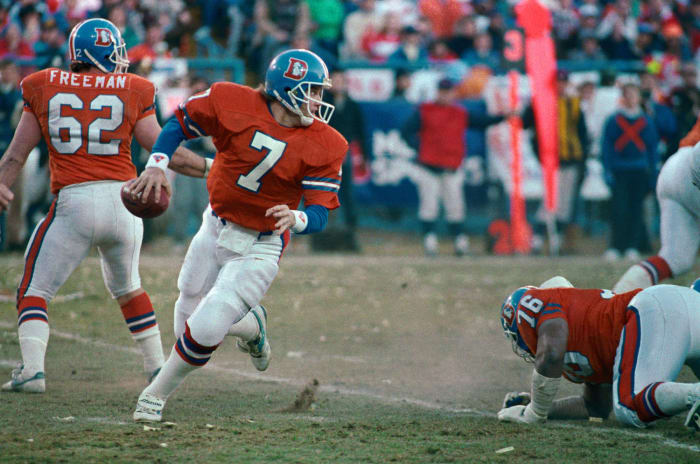
While the 1987 AFC title game gave the Browns back-to-back losses in "The" contests, "The Fumble" featured a high-octane Elway-Kosar duel. Elway threw for 281 yards and three touchdowns, first giving the Broncos a 21-3 lead and then breaking a 31-all tie after Kosar and Earnest Byner spurred a Browns comeback. Overshadowed by Byner's fumble, Elway needing just three plays to guide the Broncos 77 yards to take the lead late in the fourth quarter. Denver won 38-33, but a Byner TD would only have tied the game. The Broncos took an intentional safety after the monumental fumble.
About those '80s Super Bowls...
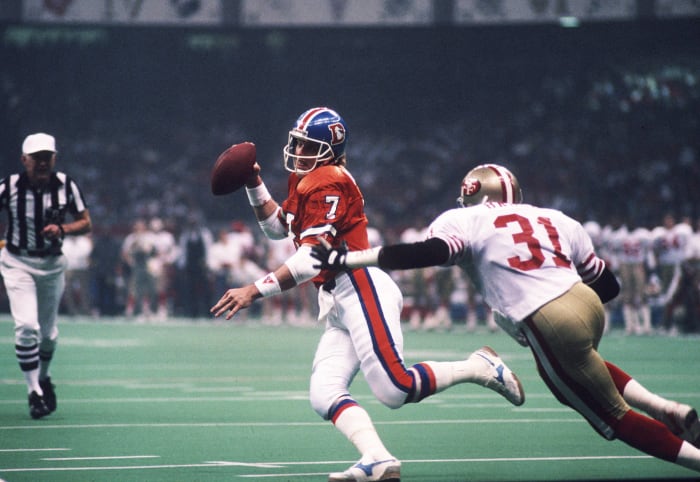
After beating the Browns in a one-sided AFC title game, the 1989 Broncos traveled to Super Bowl XXIV. They ran into arguably the NFL's greatest team ever. The 49ers thrashed the Broncos 55-10 — still a Super Bowl record for margin of victory and points scored. The Broncos lost their three '80s Super Bowls by a combined 136-40 margin. That said, Elway elevated this collection of Denver squads considerably before running into all-time 49ers and Giants teams and a Redskins offense that caught fire in a 35-point second quarter. It would take Elway another eight years to return to the NFL's top stage.
Another drive prolongs Oilers' playoff misery
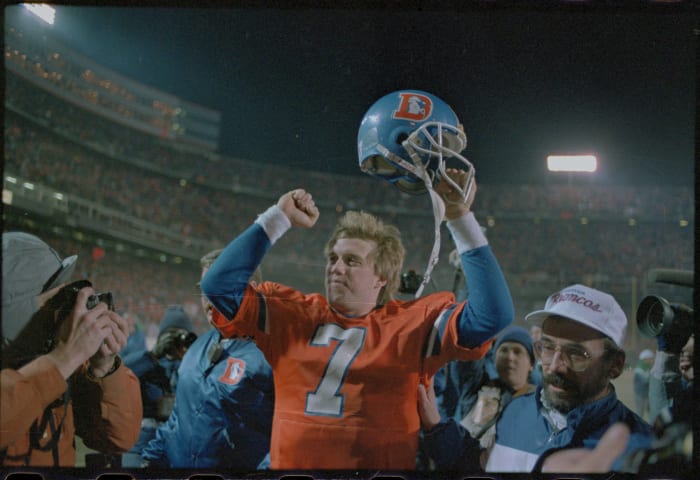
After an understandable Super Bowl hangover — a 5-11 1990 season — the Broncos went 12-4 and earned a 1991 playoff bye. Denver's No. 3-ranked defense featured three Pro Bowlers but allowed Warren Moon's Run and Shoot Oilers to take a 21-6 lead — a three-score edge in the pre-two-point conversion era — in the teams' divisional-round meeting. Up 24-23 with 1:58 left, the Oilers pinned the Broncos on their 2-yard line. With three fewer minutes to operate than in "The Drive," Elway converted two fourth downs and moved the Broncos 87 yards to set up a game-winning field goal. Buffalo, however, eliminated Denver a week later.
Chief tormentor

Thrice between 1990 and '93, the Chiefs finished with better records than the Broncos. But in all four seasons, Elway led comeback victories over Kansas City at Mile High Stadium. His masterpiece came in 1992. The Chiefs' Derrick Thomas-and Neil Smith-fronted defense stifled the Broncos for most of a Week 6 meeting, leading 19-6 with less than two minutes left. Elway then connected with Mark Jackson for a TD, and after a Chiefs three-and-out and a punt return that moved Denver inside Kansas City's 30-yard line, an Elway-to-Vance Johnson strike sank the Chiefs. K.C. lost 11 straight games in Denver from 1983-93.
Elway-Mike Shanahan reunion reshapes franchise
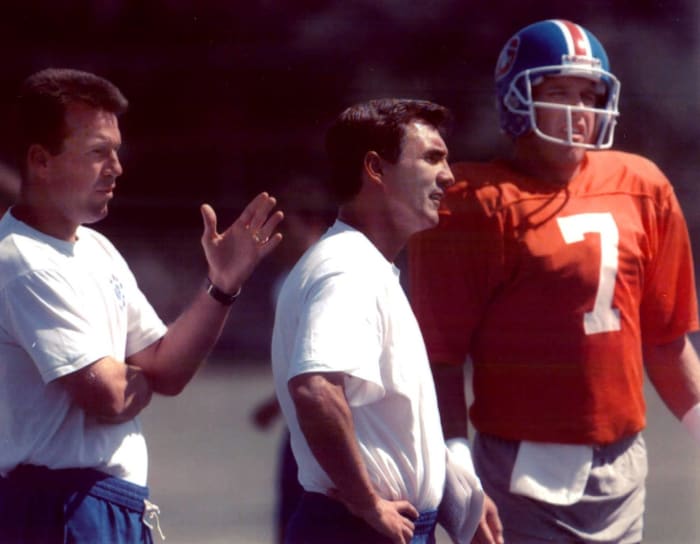
Shanahan was a Broncos assistant from 1984-87 and, after a failed Raiders head-coaching stay, returned to Denver under Dan Reeves from 1989-91. The Broncos lured him back after he coordinated the 1994 49ers' record-setting offense. Elway was a far more efficient quarterback in his 30s; Shanahan was a key reason why. The reunion sparked three more Elway Pro Bowl slates, with Shanahan's offense adding a new wrinkle — a zone-blocking scheme that unleashed Terrell Davis on the NFL — that gave Elway vital late-career support.
Historic upset ends dominant season
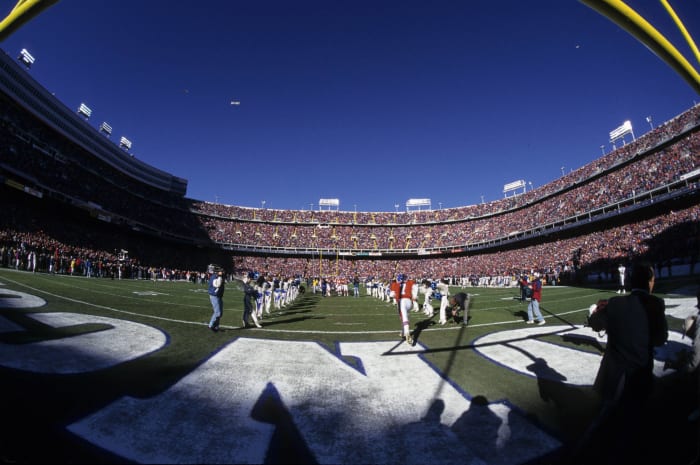
Shanahan's formula produced a 13-3 season in 1996, and the Broncos zoomed so far ahead of the AFC field that they rested starters in multiple December games. Shanahan ended up regretting that decision because of a strange opponent. The Jaguars started their sophomore season 3-6 but upset the Bills in Round 1, ending Jim Kelly's career, before falling behind 12-0 in Denver. But the Broncos defense could not contain Jags QB Mark Brunell, who vexed them throughout a 30-27 upset that ended Elway's age-36 season (and Denver's best uniform era).
Revenge tour provides another chance
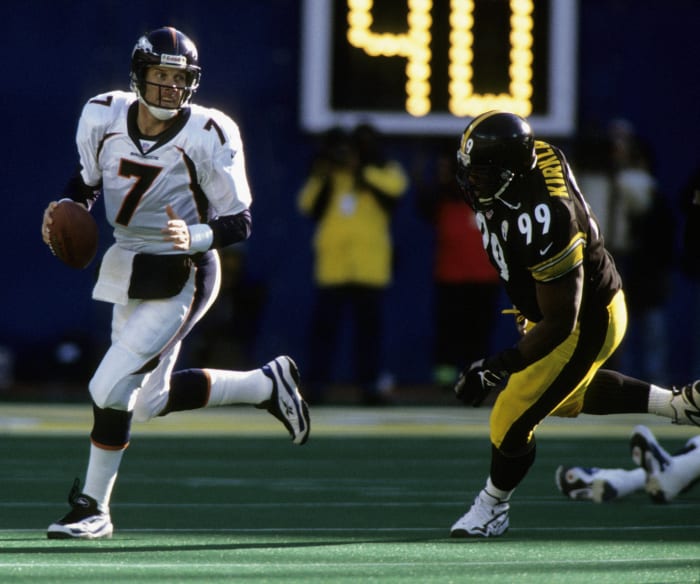
Denver's 1997 offense was much better, leading the league with 472 points and outscoring the 1996 team by nearly 100. Davis and Shannon Sharpe earned All-Pro acclaim, and Elway threw a career-high 27 TD passes. But after a 9-1 start, the Broncos lost to the Chiefs and Steelers to send them to the wild-card round. That AFC bracket created a movie montage-level itinerary, however, and the Broncos rode to Super Bowl XXXII after their revenge tour. The Broncos routed the Jaguars in Round 1, edged past the No. 1-seeded Chiefs in the rivals' only playoff meeting, and an Elway-to-Sharpe late-game connection staved off the Steelers.
Elway's defining 8 yards
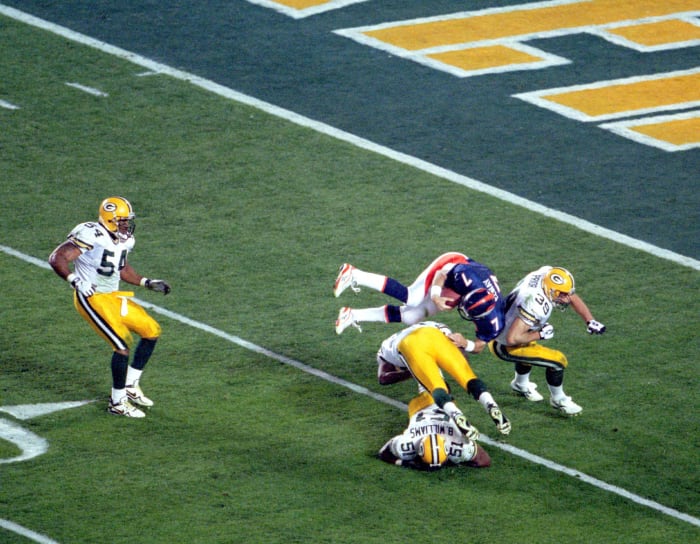
Despite being 11-point underdogs and their All-Pro running back missing most of the second quarter with a migraine headache, the Broncos forged a 17-all tie with the Packers late in the third stanza. Green Bay forced a third-and-6, and Shanahan called a play Elway warned would not fail if the Packers lined up in a certain coverage. With Green Bay doing what Elway feared, the 37-year-old ex-scrambler took off on what ironically became his most memorable run. Elway barreled into Packer DBs LeRoy Butler and Mike Prior and linebacker Bernardo Harris on an 8-yard jaunt that set up Davis' go-ahead touchdown.
Long-sought-after victory
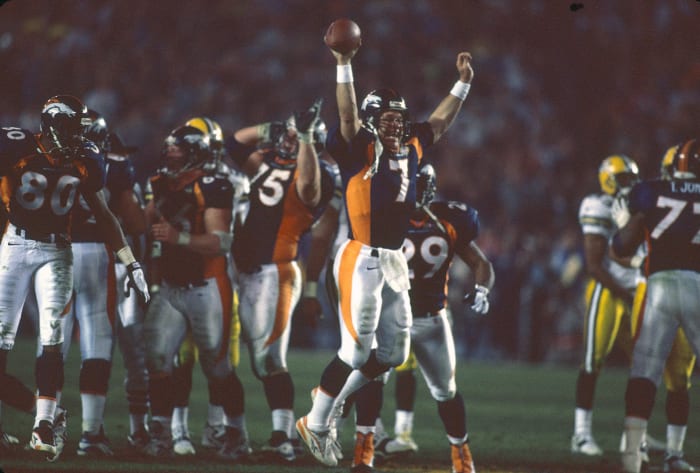
Elway spent most of his 16-year career in "Never won a Super Bowl" sentences along with 1983 draft classmates Dan Marino and Jim Kelly. The AFC had also lost 13 straight Super Bowls going into the Broncos-Packers January 1998 tilt in San Diego. Elway, who carried lesser Broncos teams to Super Bowls at his athletic apex, played a supporting role in his long-awaited victory. The 15th-year passer threw for just 123 yards, while Davis earned MVP honors for his 157-yard, three-TD, headache-surmounting night. But Elway led a go-ahead drive with under four minutes left to cap Denver's 31-24 conquest.
Going to a higher level

The zenith of Broncos football, however, occurred the next season. Elway considered retirement after Super Bowl XXXII; he returned to one of the greatest teams in NFL history. Behind nine double-digit wins and Davis' 2,000-yard form, in an MVP season, the Broncos became the third team to start 13-0. This came despite Elway missing four games due to injury. Backup Bubby Brister went 4-0 as a starter. Elway delivered one final comeback win over the Chiefs — before the 5-8 Giants ended the Broncos' perfection quest in Week 15 — and guided the team to playoff wins over the Dolphins and Jets.
Encore presentation
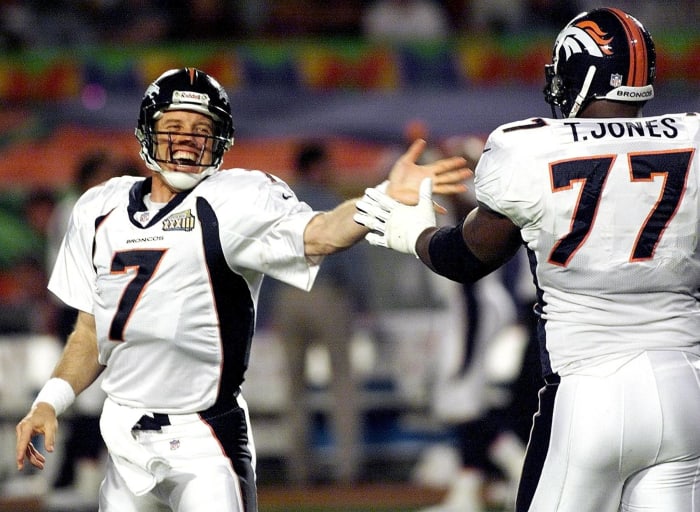
Overlooked from the Broncos' dominant late-1990s stretch: their No. 8-ranked defense allowing one touchdown (on a 1-yard Jets drive) in 12 playoff quarters. That was easy to miss after Elway's best statistical Super Bowl. In his final game, Elway earned Super Bowl MVP honors by playing the lead role in the Broncos' 34-19 win over the 14-2 Falcons. The 38-year-old passer threw for 336 yards — including an 80-yard Rod Smith TD — and rushed for a score in a game the Broncos controlled throughout. This handed ex-Broncos coach Dan Reeves a fourth Super Bowl loss.
Passing on a three-peat bid

Elway joined a notable retiree contingent in 1999, walking away alongside Michael Jordan (his second of three exits) and Wayne Gretzky. In May 1999, the Broncos legend cited the physical toll he absorbed as the primary reason for his retirement. He and future employee Peyton Manning are the only quarterbacks to retire after Super Bowl wins. Elway's younger teammates could not muster much of a three-peat effort, with Davis and Sharpe suffering season-ending injuries — a career-defining malady in Davis' case — in a 6-10 season. The Broncos did not win another playoff game until 2005.
Open-and-shut case
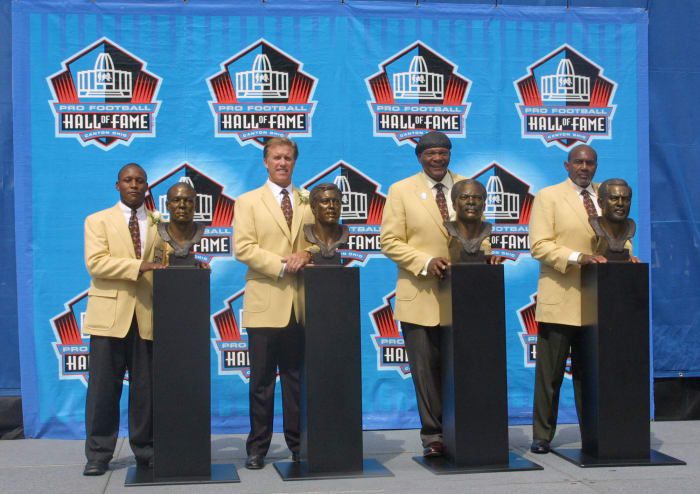
Elway was a cinch first-ballot Hall of Famer, being enshrined alongside fellow first-ballot inductee Barry Sanders in 2004. Despite the Broncos beginning play in 1960, Elway was the first Hall of Famer who primarily played in Denver. This has changed since, with Elway teammates Sharpe, Davis, left tackle Gary Zimmerman and safety Steve Atwater receiving Canton calls. Though the Broncos' eight Super Bowl berths are tied for second all time, their eight-Hall of Famer tally ranks 21st.
Among the best ever
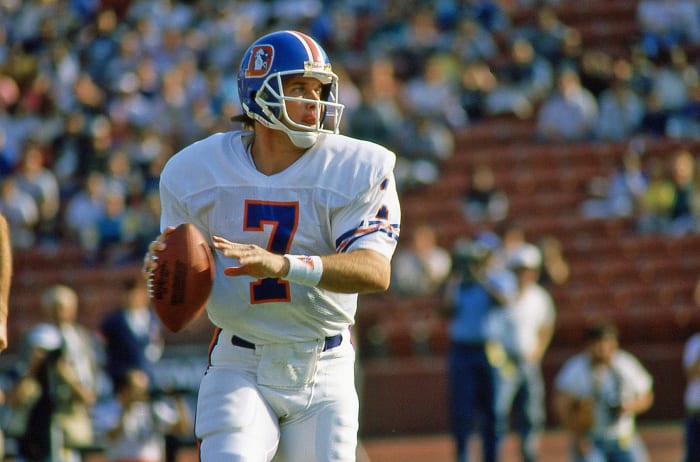
The total package at quarterback, Elway may still reign supreme in the toolbox department. He paved the way for the likes of Aaron Rodgers and Patrick Mahomes. Joe Montana's 49ers amenities dwarfed Elway's, whose prime-years stats do not astound like Dan Marino's. But the Bronco QB took teams to back-to-back Super Bowls (1986-87) as those rosters' lone Hall of Famer, had only two losing seasons, and his late-30s production exceeds both his top rivals' — en route to being named the 1990s' All-Decade passer. Even as modern QBs surpass his numbers in friendlier aerial eras, he remains on the short list of all-time greats.
A second act

After the Shanahan-Jake Plummer partnership generated mid-aughts success, the Broncos fell off track by 2010. Owner Pat Bowlen fired an overmatched Josh McDaniels after a videotaping scandal, amid a tumultuous 23-month tenure, that December. Shortly after, the Hall of Fame owner convinced Elway to return to the NFL as Broncos executive VP of football operations. Making his first draft pick future Hall of Famer Von Miller, Elway built on a nucleus that would soon play in Super Bowls. Pro Bowlers Chris Harris and Julius Thomas also arrived in 2011 — the Broncos' bizarre Tim Tebow season that produced a playoff walk-off.
Free agency coup for the ages

One of the few quarterbacks whose career outflanks Elway's changed the Broncos' path in March 2012. Numerous teams pursued Peyton Manning, and six secured visits with the longtime Colts centerpiece. Elway's team booked the first visit on Manning's much-publicized free agency tour, and the second-year GM's presence played a central role in persuading the All-Pro passer to turn down strong pitches from the 49ers and Titans. Although Manning was far from a sure thing after four neck surgeries, the quarterback's five-year, $96 million contract ignited a Broncos renaissance.
Immediate resurgence
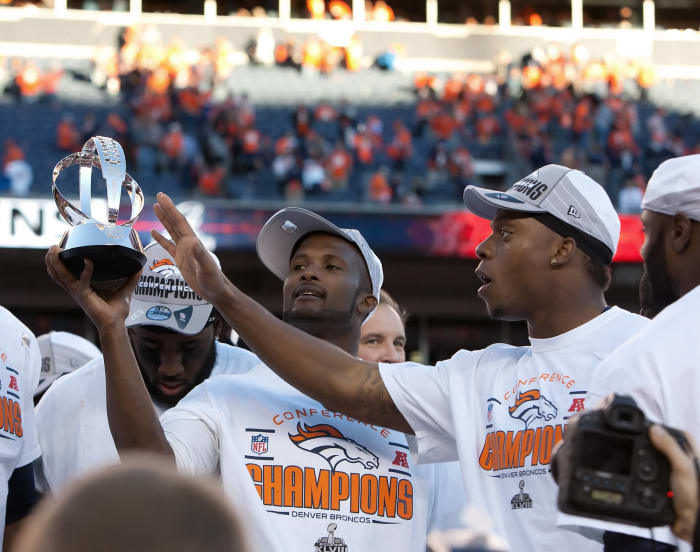
After a 3-3 start in 2012, the Broncos went 13-3. Were it not for an infamous misplay by the Broncos' secondary in a Round 2 loss to the Ravens, they likely would have qualified for Super Bowl XLVII. Denver's 2013 team removed doubt. Manning shattered the NFL's single-season touchdown pass record (55), and the Broncos' 606 points broke the single-season scoring mark. Despite the Broncos missing three of their top five players — Miller, Harris and left tackle Ryan Clady — they beat the Chargers and Patriots to win their seventh AFC championship. (Though, the Lamar Hunt Trophy design had fallen off since Elway's playing days.)
Super Bowl blowout prompts roster reboot
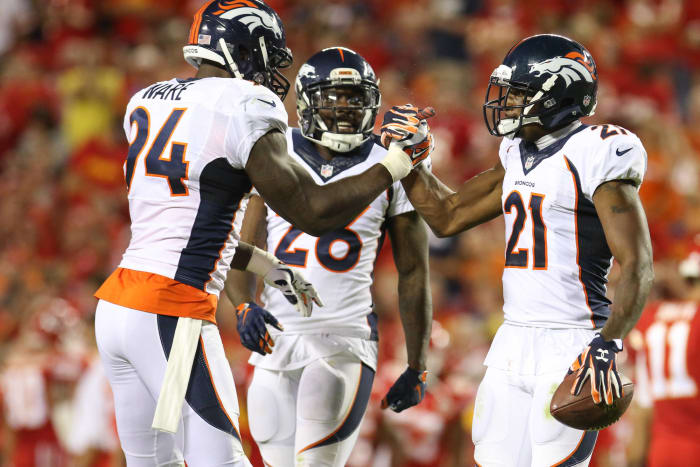
The Seahawks demolished the depleted Broncos in Super Bowl XLVIII, and Elway began to alter the makeup of his team a month later. Four future Broncos Pro Bowlers — T.J. Ward, Aqib Talib, DeMarcus Ware and Emmanuel Sanders — and Super Bowl starters signed in a five-day span. March 2014 began the team's metamorphosis into a defense-based contender. The team previously built around a record-setting offense returning to the Super Bowl behind a loaded defense remains one of the NFL's more unique roster-building efforts.
Another critical tweak
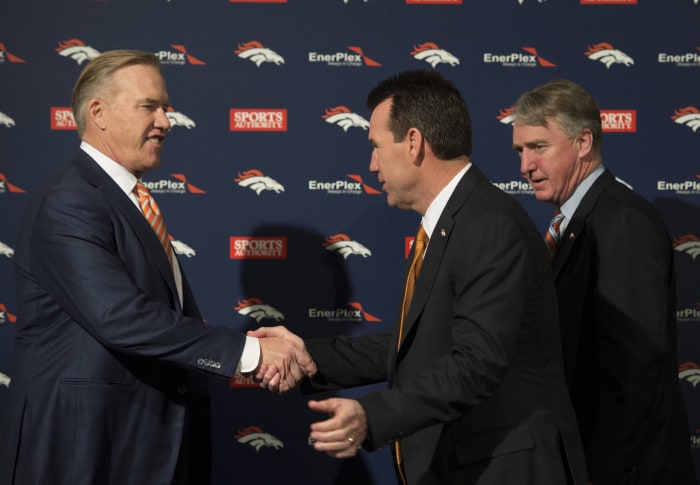
John Fox, with a major boost from Manning, coached the Broncos to a Super Bowl and three straight playoff byes. But after the 2014 team — which may have been the most talented of Denver's four Manning squads — lost to the Colts in Round 2, Elway replaced Fox with Gary Kubiak. The former Texans head coach and 2014 Ravens offensive coordinator (and ex-Elway QB2 and OC), Kubiak was not a hot coaching name on the 2015 market. But he landed in Denver. Although Manning's fit in Kubiak's offense was clunky, Elway's move paid off. The Broncos went 12-4, and Kubiak helped Brock Osweiler go 4-2 in relief of Manning.
'This one's for Pat'
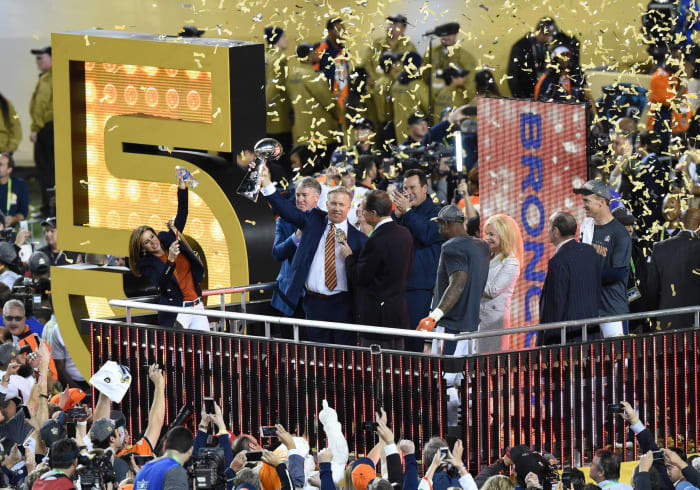
Manning's surgeries allowed him about two-and-a-half years of elite football in Denver; physical decline and other injuries followed. Denver's revitalized defense took over, with former Broncos head coach Wade Phillips back as defensive coordinator. Miller, Ware and the No Fly Zone secondary formed one of the NFL's great defenses, and it propelled the Broncos past Ben Roethlisberger, Tom Brady and MVP Cam Newton. The 24-10 Super Bowl 50 win over the favored Panthers gave Elway titles as a quarterback and GM. He paid tribute to ailing owner Pat Bowlen, whose "This one's for John" line remains a storied Super Bowl soundbite.
Can Elway find formula again?
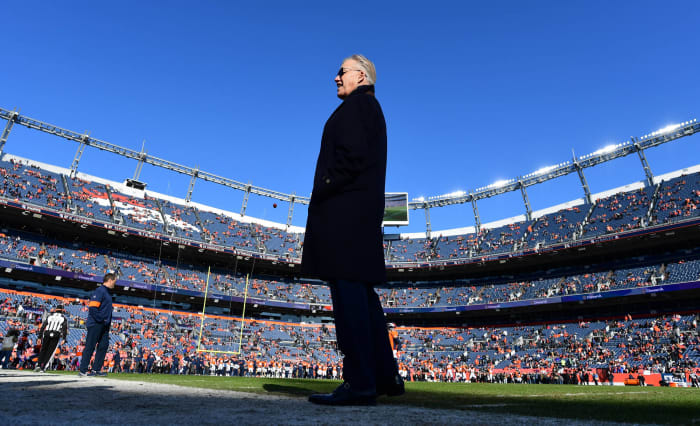
Manning's March 2016 retirement brought on a parade of Broncos quarterback acquisitions. Elway's misfire in first-round pick Paxton Lynch led to Denver starting 2015 seventh-rounder Trevor Siemian for most of two seasons. Elway then tried the veteran-retread well, but Case Keenum and Joe Flacco did not pan out either. Now in Year 10 of his GM run, Elway has settled on 2019 second-round pick Drew Lock. While the Broncos have a younger nucleus flanking Miller, its viability will hinge on Elway's latest quarterback investment.
Sam Robinson is a Kansas City, Mo.-based writer who mostly writes about the NFL. He has covered sports for nearly 10 years. Boxing, the Royals and Pandora stations featuring female rock protagonists are some of his go-tos. Occasionally interesting tweets @SRobinson25.
More must-reads:
- Lions sign veteran defensive tackle
- Legendary Broncos DC Joe Collier dead at 91
- The 'NFL MVP runners-up' quiz
Breaking News
Customize Your Newsletter
 +
+
Get the latest news and rumors, customized to your favorite sports and teams. Emailed daily. Always free!
Use of this website (including any and all parts and
components) constitutes your acceptance of these
Terms of Service and Privacy Policy.

